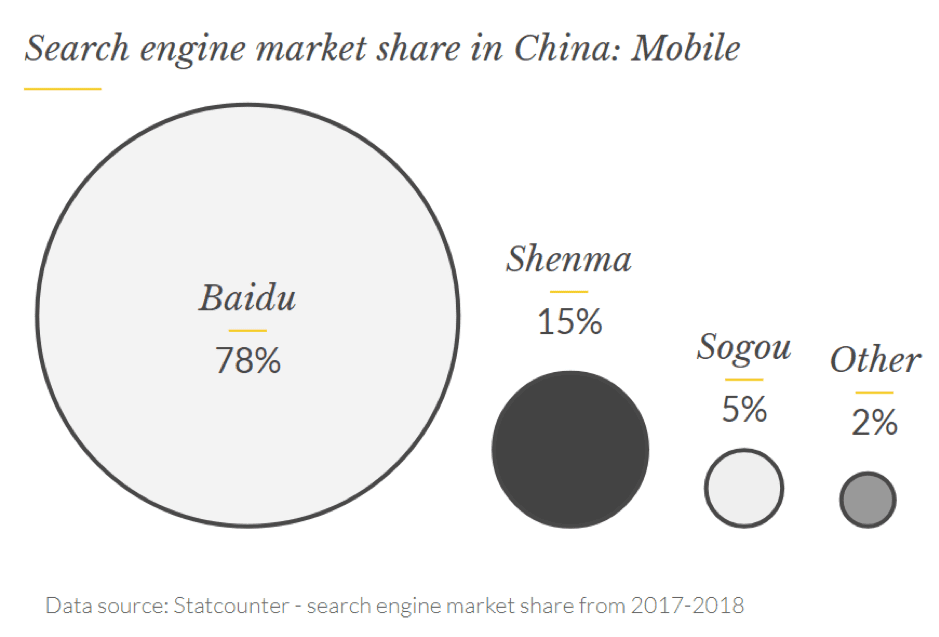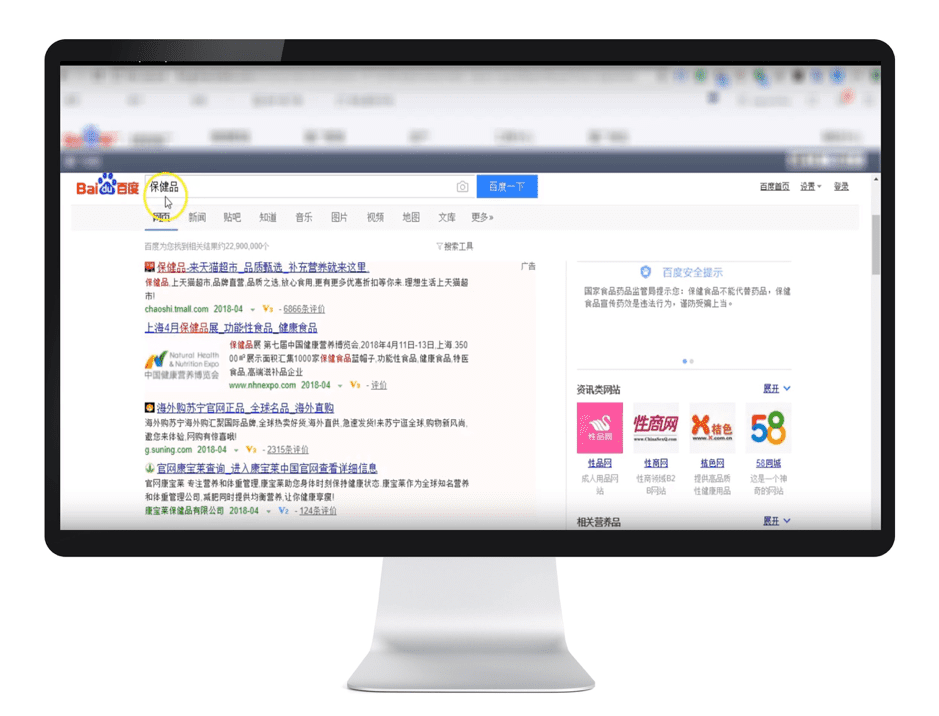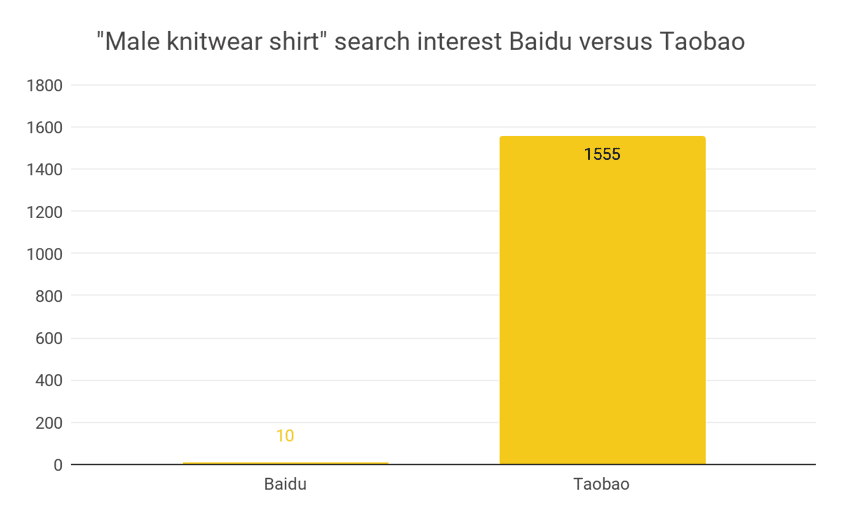Tips and tricks to help you get the most out of paid search on China’s largest search platform
With Google claiming less than 2% of the market in China, the search engine landscape is markedly different from that in most Western markets. While there are several key players, including Haosou, Sogou, and Shenma, in the space, Baidu is undoubtedly the first port of call for most companies looking to run search marketing campaigns in China.
So, why Baidu?
There are several reasons why advertisers turn to Baidu when looking to advertise their products or services to Chinese consumers, the most important of which are outlined here.
Most significant is the fact that Baidu has the highest market share across both desktop and mobile. According to Statcounter, Baidu boasts 59% of the Chinese desktop search market, with Haosou coming in in second place, with 26%. On mobile, Baidu’s dominance is even more obvious as it has a 78% market share.
 As a platform, Baidu offers advertisers more options than just paid search, with in-feed ads and display ads being two other popular advertising options on Baidu.
As a platform, Baidu offers advertisers more options than just paid search, with in-feed ads and display ads being two other popular advertising options on Baidu.
Having been set up in the year 2000, Baidu boasts a relatively mature structure compared to other search engines, together with better customer support and more open resources.
How Baidu looks on desktop and mobile
Following a scandal in 2016, Baidu has been forced to overhaul its search results ranking system.
There is now a maximum of four paid adverts shown at the top of desktop search results on Baidu, rather than the previously allowed 11. These are followed by organic results and a maximum of two paid results at the bottom of the first page of results. As shown in the screenshot below, related products or brands are also shown on the right-hand side of the results.

On mobile and tablet, Baidu search results display a maximum of three paid adverts at the top of the page, followed by organic result, and more adverts. The exact layout of results on Baidu changes from time to time, so it’s important to keep up-to-date with the latest developments.
How people search in China
Before diving into PPC advertising on Baidu, it’s worth taking a look at typical search behaviour in China.
When a search is driven by purchase intent, the vast majority of Chinese consumers would turn to an e-commerce platform such as Tmall, Taobao, or JD.com rather than searching on Baidu. This is demonstrated in the example below, which shows daily search volume for the same term – ‘male knitwear shirt’ – on Baidu and Taobao (data from Baidu keyword planner and Taobao keyword planner, respectively).

However, if Chinese consumers are at an earlier stage of their purchase journey, they are more likely to search on Baidu for product reviews, style guides and other information, to help inform their purchase decision.
The paid search opportunity on Baidu
Before you actually start investing in advertising on Baidu, it’s vital to have a good idea of the volume of impressions you are likely to receive on the platform. Baidu’s own Keyword Planner is a great starting point for estimating the number of impressions you can expect for certain phrases, allowing you insight into daily impressions, estimated cost-per-click and the level of competition for your space.
If your brand awareness levels are currently very low in China, or if the sector in which you operate is very niche, it may be better to start with upper-funnel advertising, such as paid social and display, rather than diving straight into paid search on Baidu.
Baidu account set-up
Setting up a Baidu advertiser account is a much more complex process than the equivalent on Google Ads. There are essentially two options for doing so – to be set up directly with major Baidu branches such as Beijing and Shanghai, or through a Baidu-listed agency partner.
Whichever you choose, several documents are required, which need to be translated into Simplified Chinese, including:
- Business license
- Latest bank statement
- Authorization letter
- Website screenshot
- Photos of your office building
Due to the complex, ever-changing process involved, many companies choose to work with a specialist digital agency when getting set up on Baidu.
Restrictions on Baidu
When it comes to advertising on Baidu, the landscape is very closely regulated, particularly for certain sectors. There are several blacklisted terms and phrases, including the Chinese equivalents of:
- Best, No.1, Top class
- Trustworthy
- Guarantee
- Exclusive
Industries that are particularly highly regulated include the health sector (especially health supplements), finance, and gambling – which is completely forbidden.
Getting the basics right
In many ways, getting the basics right on Baidu is much the same as on other search platforms. Having a clear account structure, for example, is vital, as is ensuring you have a good combination and split of match type, allowing you to filter the most valuable traffic.
When advertising on Baidu, localizing your ad copy is vital for success. Rather than simply translating your ad copy, ensure you use on-the-ground experts who are able to tailor your ads to the local market and trends.
Making sure you have clear tracking in place for Baidu is also vital. Using Baidu’s analytics is a great option, given its direct integration with the Baidu interface. However, using your existing global reporting system, such as Google Analytics, is also possible – just be aware that there can be data discrepancies.
Protecting your brand on Baidu
Protecting your brand and any trademarked product terms on Baidu is even more important than on other search engines, as Chinese consumers place a high value on brand recognition, generally preferring to purchase from those brands they know and trust.
Potential scenarios on Baidu may include competitors bidding on your brand term; using your brand term in their ad copy or using exactly the same ad copy as you. Some competitors may even go so far as to procure false clicks on your ads in order to quickly exhaust your budget.
Fortunately, Baidu offers various levels of (paid-for) brand protection, with the highest level meaning that competitors aren’t even able to bid on your brand keywords. If your brand already has some recognition in China, it’s worth considering Baidu’s brand search products in order to own the SERPs for your brand and trademark terms.
The ads, triggered by keywords, are interactive and media-rich, allowing brands to occupy the top position of their brand terms at all times. The product can be customized to each brand, with an example for Gucci shown below.

Key steps to Baidu PPC success
Once you have all the basics set up, there are several other steps you can take to get the most out of your Baidu campaigns, including:
Drive cost-efficiency
- Continue keyword mining
- Utilize bid modifiers – which allow you to bid differently based on device, hours, audience, ad extensions, and more
- Effective use of Baidu bid strategies
Deliver creative excellence
- Continually analyze and refresh your ad copy
- Use ad customizers to adjust the copy dynamically based on users
- Implement and test ad extensions (there are more than 37 different ad extensions in Baidu)
Test, test and test again
- Be alert to new features and test them as quickly as possible to reap the benefits
- Use Baidu’s industry target feature
- This allows advertisers to target their competitors’ audience (based on previous searches, visits etc.) in search ads.
- This feature allows you to not only target the most relevant audiences and avoid entering bidding wars with your competitors but also to build brand awareness whilst reducing cost-per-click and achieving incremental conversions.
Use extensions to increase exposure
- For instance, including a snippet image and summary can dramatically increase the click-through rate
Other opportunities
As well as all of the features outlined above, Baidu is constantly evolving, offering new and exciting opportunities for advertisers.
Baidu in-feed ads, for example, are native ads that are displayed on Baidu’s mobile site, browser and bulletin board system (BBS), Tieba. Tapping into growing mobile usage and changing consumer behaviours, in-feed ads are becoming one of the most popular advert formats in the Chinese digital space, allowing advertisers to:
- Reach new audiences
- Boost brand awareness
- Retarget existing users

Baidu Baike is another Baidu product worth having on your radar. The equivalent to Wikipedia in China, Baike boasts up to 14,880,000 daily active users and is afforded high priority in organic results on Baidu.
In order to get the most out of Baidu Baike:
- Ensure your brand term is listed in Baidu Baike
- Ensure the listing has your most up-to-date information
- Bear in mind that an experienced Baidu account is required to create and update a listing
- Plan carefully before making any changes in Baidu Baike
In conclusion
It’s clear that Baidu presents a huge opportunity for advertisers looking to tap into the Chinese market. Whilst Chinese consumers looking to buy will usually go to an e-commerce site first, they often still search for reviews, advice and other information on Baidu.
Before investing in PPC on Baidu, it’s vital to evaluate traffic volumes, as well as being aware of China’s advertising policy and industry-specific rules. In addition, you should be prepared for higher levels of competitive bidding activity than you may be used to on other platforms.
By localizing your ads and keywords, rather than simply translating them, as well as making the most of the latest ad extensions and other features available, you will set yourself up for the best chances of success on Baidu.
